- Home
- Deepak Chopra
The Book of Secrets: Unlocking the Hidden Dimensions of Your Life Page 17
The Book of Secrets: Unlocking the Hidden Dimensions of Your Life Read online
Page 17
What this means is that we are exquisitely sensitive to the balance of positive and negative forces, and when the balance is tipped, death is the natural response. Nietzsche once remarked that humans are the only creatures who must be encouraged to stay alive. He couldn’t have known that this is literally true. Cells receive positive signals that tell them to stay alive—chemicals called growth factors. If these positive signals are withdrawn, the cell loses its will to live. Like the Mafia’s kiss of death, the cell can also be sent messengers that bind to its outer receptors to signal that death has arrived—these chemical messengers are actually known as “death activators.”
Months after writing this paragraph I met a Harvard Medical School professor who had discovered an amazing fact. There is a substance that causes cancer cells to activate new blood vessels so that they can get food. Medical research has focused on finding out how to block this unknown substance so that malignant growths can be deprived of nutrients and thus killed. The professor discovered that the exact opposite substance causes toxemia in pregnant women, a potentially fatal disorder in which the blood vessels are “unhappy” that they are undergoing normal programmed cell death. “You realize what this means?” he said with deep awe. “The body can trigger chemicals in a balancing act between life and death, and yet science has totally ignored who is doing the balancing. Doesn’t the whole secret of health lie in that part of ourselves, not in the chemicals being used?” The fact that consciousness could be the missing ingredient, the X factor behind the scenes, came to him as a revelation.
The mystics have preempted science here because one reads in many mystical traditions that every person dies at exactly the right time and knows in advance when that time is. But I would like to examine more deeply the concept of dying every day. To die every day is a choice everyone overlooks. I want to see myself as the same person from day to day in order to preserve my sense of identity. I want to see myself as inhabiting the same body every day because it is disturbing to think that my body is constantly deserting me.
Yet it must, if I am not to be a living mummy. Following the complex timetable of apoptosis, I am given a new body via the mechanism of death. This process happens subtly enough that it passes without notice. No one sees a two-year-old turning in her body for a new one at age three. Every day she has the same body, and yet she doesn’t. Only the constant process of renewal—a gift of death—enables her to keep pace with each stage of development. The wonder is that one feels like the same person in the midst of such endless shape-shifting.
Unlike with cell death, I can observe my ideas being born and dying. To support the passage from childish thought to adult thought, the mind has to die every day. My cherished ideas die and never reappear; my most intense experiences are consumed by their own passions; my answer to the question “Who am I?” totally changes from age two to three, three to four, and so on throughout life.
We understand death when we drop the illusion that life must be continuous. All of nature obeys one rhythm—the universe is dying at the speed of light yet it still manages along the way to create this planet and the life forms inhabiting it. Our bodies are dying at many different speeds at once, beginning with the photon, ascending through chemical dissolution, cell death, tissue regeneration, and finally the death of the whole organism. What are we so afraid of?
Apoptosis rescues us from fear, I think. The death of a single cell makes no difference to the body. What counts is not the act but the plan—an overarching design that brings the balance of positive and negative signals that every cell responds to. The plan is beyond time because it dates to the very construction of time. The plan is beyond space because it is everywhere in the body and yet nowhere—every cell as it dies takes the plan with it, and yet the plan survives.
In the one reality, you don’t settle an argument by picking sides—both sides of any argument are equally true. So I have no trouble conceding that what happens after death is invisible to the eye and cannot be proved as a material event. I concede without question that we normally don’t remember our past lives and can live very well without that knowledge. Still, I don’t understand how anyone can remain a materialist after seeing apoptosis at work. The case against life after death looks strong only if you ignore everything discovered about cells, photons, molecules, thoughts, and the whole body. Every level of existence is born and dies on its own timetable, from less than a millionth of a second to the probable rebirth of a new universe billions of years from now. The hope that lies beyond death comes from the promise of renewal. If you passionately identify with life itself instead of with the passing parade of forms and phenomena, death takes its rightful place as the agent of renewal. In one of his poems, Tagore asks himself, “What will you give / When death knocks at your door?” His answer displays the untroubled joy of someone who has risen above the fear surrounding death:
The fullness of my life—
The sweet wine of autumn days and summer nights,
My little hoard gleaned through the years,
And hours rich with living.
That will be my gift
When death knocks at my door.
CHANGING YOUR REALITY TO ACCOMMODATE THE TENTH SECRET
The tenth secret says that life and death are naturally compatible. You can make this secret personal by shedding the image of yourself that belongs to the past—a kind of exfoliation of your self-image. The exercise is very simple: Sit with your eyes closed and see yourself as an infant. Use the best baby picture you can remember, or if you don’t recall such an image, create one.
Make sure the baby is awake and alert. Catch its attention and ask it to look into your eyes. When you’ve made contact, just gaze for a moment until you both feel settled and connected to each other. Now invite the baby to join you and slowly watch the image fade into the center of your chest. You can visualize a field of light that absorbs the image if you want, or just a warm feeling in your heart.
Now see yourself as a toddler. Again, make contact and once you have, ask that version of you to join you. Proceed in this way through any past self you wish to bring to mind—if you have particularly vivid memories of a certain age, linger there, but ultimately you want to see every image fade and disappear.
Continue up to your present age, and then go on to see yourself in stages older than you are now. End up with two final images: one of you as a very old person but in good health, and one of you on your deathbed. In each case make contact, and then let the image be absorbed into you.
When the image of yourself dying is gone, sit quietly and feel what remains. No one can actually imagine his or her own death because, even if you go to the extent—which may be too gruesome for many people—of seeing yourself as a corpse being lowered into the grave and decomposing to its elements, the witness will remain. Visualizing yourself as a corpse is an ancient Tantric exercise from India, and I have led groups through it. Almost everyone gets the point, which has nothing to do with gruesomeness: When you see every earthly vestige of yourself vanish, you realize you will never succeed in extinguishing yourself. The presence of the witness, who is the ultimate survivor, points the way beyond the dance of life and death.
Exercise #2: Dying Consciously
Like every experience, dying is something you create as much as something that is happening to you. In many Eastern cultures, there is a practice called “conscious death,” in which the person participates actively in shaping the dying process. Using prayer, rituals, meditation, and assistance from the living, the dying person shifts the balance from “this experience is happening to me” to “I am creating this experience.”
In the West, we don’t have a tradition of conscious death. In fact, we leave dying people alone in impersonal hospitals where the routine is cold, frightening, and dehumanizing. There is much to change on that front. What you can do personally at this moment is to bring your awareness to the dying process, ridding it of excessive fear and anxiety.
Think of someone close to you who is elderly and close to dying. See yourself in the room with the person—you can imagine the room if you don’t have actual knowledge of where the person is. Put yourself inside the mind and body of the person. See yourself in detail; feel the bed, see the light coming in through the window, and surround yourself with the faces of family and attending doctors and nurses, if there are any.
Now begin to assist the person in the shift from passively facing death to actively creating the experience. Hear yourself talking in a normal voice; there’s no need for solemnity. Be comforting and reassuring, but focus primarily on shifting the person’s awareness from “this is happening to me” to “I am doing this.” Here are the main themes to talk about (I’ve put them in the second person, as if confiding in a close friend):
I think you’ve had a beautiful life. Let’s talk about the best things you remember.
You can be proud of having turned out to be a good person.
You have created a lot of love and respect.
Where would you like to go from here?
Tell me how you feel about what’s happening. How would you change it if you could?
If you have any regrets, tell me about them. I’ll help you let go of them.
You have no more need for sorrow. I’ll help you let go of any that you still feel.
You deserve to be at peace. You have run your race well, and now that it’s finished, I’ll help you home.
You won’t believe this, but I envy you. You are about to see what’s behind the curtain.
Is there anything you want for your journey?
You can, of course, bring the same themes to the bedside of someone who is truly dying. But having an imaginary conversation is a good way to reach down into yourself. The process shouldn’t be a once-over-lightly. Each topic could last an hour. To be really engaged, you’ll need to feel that you are giving yourself ample attention. This exercise should bring up very mixed feelings, since we all harbor fear and sorrow at the prospect of death. If you have someone in your life who died before you were able to bid them a complete farewell, imagine talking to the person about the themes I just listed. The domain where life and death merge is always here with us, and by paying attention to it you connect yourself to a precious aspect of awareness. Dying in full awareness is completely natural if you have lived in full awareness.
Secret #11
THE UNIVERSE THINKS
THROUGH YOU
I RECENTLY HAD A SMALL ENCOUNTER with destiny—so small that I could have ignored it entirely. A man came to visit me who had devoted his entire life to spirituality. He told me about his many visits to India and his devotion to its ways. He wore amulets of the kind you can buy at temples and holy sites; he knew many sacred chants, or Bhajans; he had been blessed by many holy men in his travels. Some had given him mantras as a gift. A mantra can be as short as a syllable or as long as a sentence, but it’s basically a sound. In what way can a sound be a gift? To someone steeped in the Indian tradition, the gift isn’t the mantra itself but the effect it’s meant to bring, such as wealth or a good marriage. There are thousands of mantras and thousands of possible results they bring.
When I asked him what he did for a living, the man waved his hand and said, “Oh, a little healing, a little psychic stuff. You know, mind-reading. I don’t pay much attention to it.”
His careless attitude intrigued me, and I asked if he could show me an example. He shrugged. “Think of somebody and write down a question you want to ask them.” The only person on my mind that day was my wife, who had been visiting family in New Delhi for a while. I reminded myself that I should call to ask her when she was planning to return—we hadn’t set a fixed date since some of the family members were elderly, and my wife’s stay depended on how well they were doing.
I wrote this down and looked at my visitor. He closed his eyes and began to chant a long mantra. After a minute he said, “Tuesday. You’re thinking about your wife, and you want to know when she’s coming home.”
He had got it right, and after he left and I was able to phone my wife, he got the day of her return right, too. I congratulated him, but he smiled and waved his hand with the same careless gesture that said, “It’s nothing. I barely pay attention to it.” An hour later, when I was alone, I began to think about these psychic events, which are no longer a novelty, given how the media play up paranormal phenomena. Specifically, I wondered about free will and determinism. This man said he could read minds, but my wife’s return on Tuesday wasn’t on my mind. It was an event that could have fallen on any day of the week; I had even supposed that she might continue to stay indefinitely if circumstances dictated.
The question of free will versus determinism is huge, of course. In the one reality, every pair of opposites is ultimately an illusion. We’ve already blurred the division between good and evil and life and death. Is free will going to turn out to be the same as determinism? A lot seems to ride on the answer.
FREE WILL =
Independence
Self-determination
Choice
Control over events
Future is open
DETERMINISM =
Dependence on an outside will
Self determined by fate
No control over events
Choices made for you
Future is closed
These phrases sketch in the common understanding of what’s at stake. Everything in the free-will column sounds attractive. We all want to be independent; we want to make our own decisions; we want to wake up with hope that the future is open and full of endless possibilities. On the other hand, nothing seems attractive in the determination column. If your choices have been made for you, if your self is tied to a plan written before you were born, then the future cannot be open. Emotionally at least, the prospect of free will has already won the argument.
And at a certain level nobody has to delve any deeper. If you and I are marionettes operated by an invisible puppeteer—call him God, fate, or karma—then the strings he’s pulling are also invisible. We have no proof that we aren’t making free choices, except for the occasional spooky moments of the kind I began with, and mind-readers aren’t going to change how we fundamentally behave.
There is a reason to delve deeper, however, and it centers on the word Vasana. In Sanskrit, a Vasana is an unconscious cause. It’s the software of the psyche, the driving force that makes you do something when you think you’re doing it spontaneously. As such, Vasana is very disturbing. Imagine a robot whose every action is driven by a software program inside. From the robot’s point of view, it doesn’t matter that the program exists—until something goes wrong. The illusion of not being a robot collapses if the software breaks down because then, if the robot wants to do something but can’t, we know the reason why.
Vasana is determinism that feels like free will. I’m reminded of my friend Jean, whom I’ve known for almost twenty years. Jean considers himself very spiritual and went so far in the early nineties as to walk way from his job with a newspaper in Denver to live in an ashram in western Massachusetts. But he found the atmosphere choking. “They’re all crypto Hindus,” he complained. “They don’t do anything but pray and chant and meditate.” So Jean decided to move on with his life. He’s fallen in love with a couple of women but has never married. He doesn’t like the notion of settling down and tends to move to a new state every four years or so. (He once told me that he counted up and discovered that he’s lived in forty different houses since he was born.)
One day Jean called me with a story. He was on a date with a woman who had taken a sudden interest in Sufism, and while they were driving home, she told Jean that according to her Sufi teacher, everyone has a prevailing characteristic.
“You mean the thing that is most prominent about them, like being extroverted or introverted?” he asked.
“No, not prominent,” she said. “Your prevailing characteristic is hidden. You act on it without s
eeing that you’re acting on it.”
The minute he heard this, Jean became excited. “I looked out the car window, and it hit me,” he said. “I sit on the fence. I am only comfortable if I can have both sides of a situation without committing to either.” All at once a great many pieces fell into place. Jean could see why he went into an ashram but didn’t feel like he was one of the group. He saw why he fell in love with women but always saw their faults. Much more came to light. Jean complains about his family yet never misses a Christmas with them. He considers himself an expert on every subject he’s studied—there have been many—but he doesn’t earn his living pursuing any of them. He is indeed an inveterate fence-sitter. And as his date suggested, Jean had no idea that his Vasana, for that’s what we’re talking about, made him enter into one situation after another without ever falling off the fence.
“Just think,” he said with obvious surprise, “the thing that’s the most me is the thing I never saw.”
If unconscious tendencies kept working in the dark, they wouldn’t be a problem. The genetic software in a penguin or wildebeest guides it to act without any knowledge that it is behaving much like every other penguin or wildebeest. But human beings, unique among all living creatures, want to break down Vasana. It’s not good enough to be a pawn who thinks he’s a king. We crave the assurance of absolute freedom and its result—a totally open future. Is this reasonable? Is it even possible?

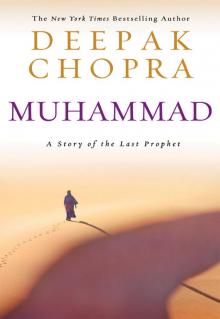 Muhammad: A Story of the Last Prophet
Muhammad: A Story of the Last Prophet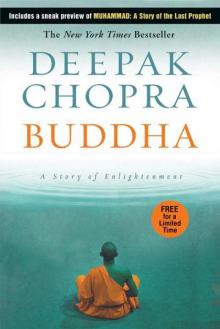 Buddha
Buddha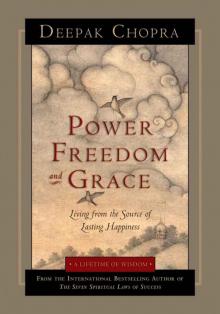 Power, Freedom, and Grace
Power, Freedom, and Grace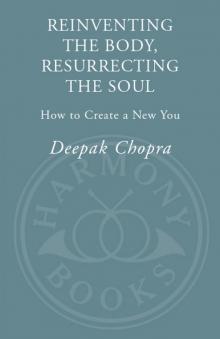 Reinventing the Body, Resurrecting the Soul: How to Create a New You
Reinventing the Body, Resurrecting the Soul: How to Create a New You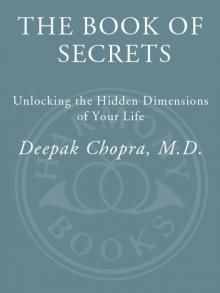 The Book of Secrets: Unlocking the Hidden Dimensions of Your Life
The Book of Secrets: Unlocking the Hidden Dimensions of Your Life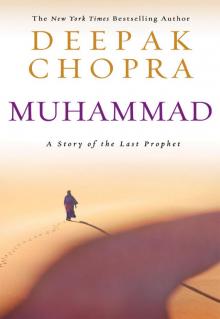 Muhammad
Muhammad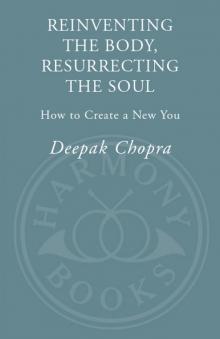 Reinventing the Body, Resurrecting the Soul
Reinventing the Body, Resurrecting the Soul